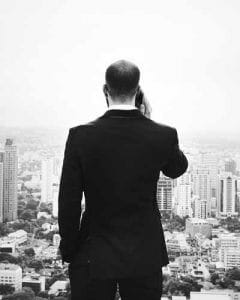The following is the second part of an interview I did a few years ago for the book “Intuition and Success“. You can read the first part here.
QUESTION: How often do you use intuition?

My whole life is based on intuition. As I said, in the book “Health is within us”, in about 50 pages, I describe an example of finding a suitable healing method when I was fighting for my life. If I had not trusted my intuition to somehow tell me what was best for me, I would have been lost in the search for the best option, or I would have grabbed the first option, fearing that I had to start a therapy as soon as possible.
In both cases, not following my intuition could cost me my life.
The same applies to other areas. Even when the facts show me a very clear picture, I usually “study” the situation in meditation, imagining developments and closely following my thoughts and feelings. Sometimes I ask myself a question before going to sleep or just like that; during a walk, for example.
I have learnt that intuition often comes up in the most unusual circumstances; almost always when I withdraw energy from the area where I am looking for an answer. Therefore, I do not set time frames for when or how I would like to receive an answer.
It no longer surprises me if the answers reveal themselves in the shower, while jogging or walking, in the gym, in meditation… Or even in the midst of high mental activity or occupation with some other project.
In short, I “let all the important decisions pass through me” until I get a clear answer on how to proceed. If I don’t get an answer, it means that the time has not yet come to make a decision. Although it may not look like it, in this case too, the message is clear: not yet.
This was a very important lesson for me – don’t make decisions in a hurry or under pressure. Sometimes the dice just haven’t fallen into place enough for a clear picture to emerge and for you to make a wise decision. So I simply wait to make a decision, without feeling that I am missing something.
If the other side is pressing me for a deadline by which I have to communicate my decision – and they are offering me a very short deadline – I simply refuse the offer.
How important is intuition in your work?

My work has two big components: making decisions on my own projects and advising others.
I have already briefly outlined my approach to the first area: I “run through” every important decision, monitoring my thoughts and feelings. I am careful not to make decisions based on mental desires or short-term impulses. I usually first call to mind the vision I am working towards, and then I weave into it the question of the decision at hand. I wait for the answer, which must always be correlated with the vision.
Another area is advice. When I meet people who are at a major turning point and are looking for answers about how to move forward, I rely almost exclusively on intuition, or on the insight or knowledge I gain from talking to that person.
If I were working to a set protocol, I would not be able to advise people on what is best for them, but on what I thought was best for them at the time. Following my intuition also means that I am giving advice to someone that I know would not be good advice for me. For example, I am very disciplined and persistent. When I decide to do something, I no longer hesitate, but go ahead with full confidence.
I follow the instructions to the letter and persevere to the end. But many people function differently. If I were to take my advice from within myself, or if I were to assume that my advisees would follow my advice in a disciplined way and adhere strictly to the guidelines, most of the time the results would not happen.
In fact, I can’t imagine my work with people without intuitive help, because the prerequisite for being able to give advice to someone is complete identification with the other person: putting myself in the background and placing myself energetically in the other person’s life situation. For a moment I try to live the life of the person in front of me. Then I allow myself to feel the blockages, challenges and opportunities. What usually happens then is that I start to say things to the person that I could not “logically” know. I say that we fall into timelessness, or rather that we build a “channel with Source”.
The information that comes to me is sometimes really strange and there is no way I could have arrived at it through logic, or by considering and processing known facts.
In what mood or emotional state are you most receptive to intuitive signals?

Different. In a state of relaxation, when I’m doing completely different things … in a state of heightened joy … but also in a very intense state, when I’m working on some other project. I have found that intuitive flashes are also a mind game to keep me in my comfort zone. For example, when I want to start working on something new, I get a deep impulse or suggestion about an existing issue. It is as if the mind wants to distract me from the new path and keep me on the existing one.
If I receive messages through symbolic signs from the environment, they come regardless of my condition. But it is very important that I perceive, trust and follow these messages – whether in the form of thoughts, feelings or symbolic signs in my surroundings. In this way, I literally create a relationship with them; very similar to the one you have with a person when they are not around but you feel them.
The more I trust and follow this guidance, the more often it appears and the more concrete messages it brings me.
And there is something else that is extremely important. Intuition is best heard when we distance ourselves completely from the outcome. As long as we unconsciously desire a certain outcome, we will be much more receptive to messages that would confirm the path is moving in the desired direction. Other messages are not perceptible. Or we do, but then we rationalise them, generalise them, deny them, interpret them in our own way, and so on.
Do you agree with the statement that intuition grows with one’s experience?
First, it is necessary to distinguish between what is a message that comes from routine and what is an intuitive message. I would not call experience-based knowledge intuition. For me, an intuitive message is one that is not the result of facts or of “stacking the dice” in a certain order in a certain story, but is usually completely outside the concept.
For example, if I judge the character of the person standing in front of me by their energy posture and a few spoken sentences, I wouldn’t call it intuition, but experience. Or, perhaps even better – with experience comes the ability to make routine decisions; wisdom that comes from experience.
I would rather say that intuition grows with one’s desire for it, one’s willingness, openness and trust in it.
How does your intuition most often communicate with you?
Most often during meditation, through thoughts, feelings or even visual images. Otherwise, as I have mentioned a few times, through symbolic messages that happen in the surroundings.
Does your intuition manifest itself in any physical signs (headache, strange feeling in the stomach, stomach pain, etc.)?
I am not so perceptive of bodily signs because too often I confuse them with conscious or unconscious fears or desires. Of course, I also get a knot in my stomach before an “interesting” meeting, but the feeling I get at the thought of the meeting is more relevant or easier to trust.
In fact, physical signs are often a sign of resistance to the new or the unknown: if I don’t want something, I feel it through physical resistance. But this does not mean that the experience to follow will be negative. Maybe I’m just not used to it, so I don’t feel comfortable with it, and my body makes that clear.
In such situations, as I said, I trust my thoughts and feelings more.
When the facts point one way and your intuition points the other, how do you react?

As long as all the messages do not express a similar message, I do not decide, but let the idea crystallise. First, I ask myself whether I am consciously or unconsciously resisting something just because I don’t feel comfortable with it. Then I ask myself whether perhaps my desire for certain developments or results is too great, and I am therefore neglecting my genuine feelings.
During this time, when I am allowing feelings and facts to come together into a homogeneous image, I put myself in what is called the state of the outside observer, where I observe myself and my reactions as if they were happening to another person.
Then I ask myself what I would advise that person who, in an identical situation to mine, asked me for advice.
This is advice from the ancient Mystery School. Because we often make different choices when it comes to ourselves than we would advise someone with whom we are not in a very genuine emotional relationship. In the latter case, we are impartial, we do not go out of our comfort zone and we do not think about what the decision will entail. This makes for wiser and more mature decisions.
This ensures that I do not make decisions emotionally or out of a desire for short-term gratification, but rather to follow a long-term vision. I have found that separating intuition from emotion is one of the key problems.
How often do you ignore your intuition?
Probably more than I would like. This happens to me in two situations: consciously, when I receive a message and don’t react, or when I don’t perceive the message. There are quite a few of the latter situations. The best example is my health ordeal. Very often I have received a sign that I have gone astray on the road through very clear symbolic messages, for example, car accidents. But I ignored these messages because I was firmly convinced that I was on the right path. Therefore, these symbolic messages escalated and brought me more and more severe lessons, culminating in the diagnosis of a serious illness and the realization that I might only have half a year to live.
And even then, at the beginning, I refused to change and continued my business path by force until I was confronted with a clear fact. Only then did I stop, reflect and turn inwards.
Intuitive messages also vary in their level of importance. If your intuition warns you not to expect much from your next meeting, that’s very different from telling you that your life has gone off track.
The more we desire something, the harder it is to hear intuition, because the energy of our conscious efforts literally kills the gentle and silent message of the heart or intuition. (Note: I use the term heart to refer to intuitive messages that come in the form of feelings, and intuition to refer to messages that I perceive mentally.)
Do you use any methods, techniques or special personal rituals to raise your intuitive functioning?

In fact, I have been learning to hear intuitive flashes and feelings since I was very young, but not through any special techniques. But I do use analysis. For example, when something unpredictable happens, I go back in my mind to a time before the event and ask myself whether I might have missed a sign. I almost always find it.
Then I try to apply this finding to my life. Basically, I am constantly observing what is going on around me, following my thoughts, feelings and signs, and then putting my intuitive decisions into practice. I find that the more times and the more intensively I analyse my intuition, the more I “feel” it, or the more easily I perceive its messages.
For people who would like to develop intuition or establish a relationship with it, I suggest that they first imagine it as a person to whom they assign the qualities they expect in intuition. For example, they might imagine a wise man with a beard who is always compassionate, good humoured, fair and wants to do his best to help us make the decisions that would benefit us most in the long run.
Then we mentally connect the intuitive messages to this imaginary person or icon so that we perceive them as the same source. The closer we get to this energy, the more often we will feel its messages, and we will also be able to distinguish them from other energy messages.
We can also develop the technique of having an imaginary conversation with that person. Imagine asking a key question, then calm yourself and wait for an answer.
I also suggest that people keep a diary of how and in which situations they have received correct intuitive flashes. They can evaluate them, besides their accuracy, also in terms of their intensity or penetrability. Through reading the notes, it is easier to find a pattern of when and in what way intuitive messages reveal themselves to us.
It is also very useful to keep a diary of special events, good and bad. And then to ask ourselves whether we might not have received a message beforehand that heralded a change.
Would you agree with the statement that the development of one’s intuition is directly correlated with one’s success and achievement?

Not really. Some material achievements are the result of mental determination, discipline, perseverance and dedication. There are many highly successful people who have dedicated their lives to business success, while at the same time breaking bridges in all other areas – even though they may have received intuitive flashes that their path may not be the right one.
In short, you can be successful, even if your intuition keeps telling you that you’re not moving in the right direction.
Of course, the main question is what success and achievement are. For me, success is when I can maintain a state of joy, relaxation and gratitude for life throughout the day, whatever the circumstances. When I am in a state of peace, fulfilment and love for everyone and everything, great desires and goals fall away. After all, every material desire carries these very attributes – peace, fulfilment, joy… And if I can get there without great effort and tectonic shifts, I am content.
Material achievement, which happens as a consequence, is quite another. This means that I do not subordinate my life to a specific (material) goal, but to an expression of creativity. And what this expression of creativity brings in the form of material achievement is a bonus, not my primary goal.
The paradox is that the more detached I am, and the less I try to force circumstances to go in a direction I have chosen, the easier it is to achieve my goal.
Can you describe an example of intuition from your professional or private life that has stuck in your mind?
Sometimes intuition speaks to us literally, through people. I remember a time when my wife and I were on a honeymoon in Thailand. At that time, I told a stranger with whom I was trekking some deep thoughts about life. She enthusiastically said to me, “You should write a book … ” This was at a time when I had very different goals and aspirations and I had never even dreamt of associating myself with writing.
But I received a very different message, one that touched me deeply, when I was in a serious state of health and I really did not know whether I would survive another day or not. Suddenly I was struck by the thought that everything was fine; as it should be… perfect. This message was so powerful that I trusted it and was able to relax. Whenever I thought of it, a special feeling of magnificence came over me; as if everything was taken care of and I didn’t have to do anything.
I believe that my health started to turn around then, although it took many years for my body to fully recover.
